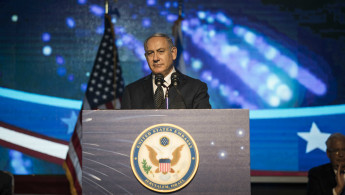Israel's Netanyahu hints at early elections in 2019
Netanyahu may force premature parliamentary elections for early 2019 due to a disagreement with Hasidic Jews over military conscription laws
2 min read
Israel's PM may be looking to capitalise on positive polling [Getty]
Israel's Prime Minister Binyamin Netanyahu issued fresh warnings of early elections on Sunday, in the event that the Knesset does not pass a draft law on military conscription in the next two weeks.
The Israeli premier reportedly made the remarks in anger at a meeting of heads of the government coalition parties.
Netanyahu is allegedly pushing for elections to fall in mid-February 2019, according to Haaretz. His term is due to end in November 2019.
Netanyahu's government has for years been seeking to push through a revised law on military conscription to increase the number of ultra-orthodox Israelis doing military service.
Most Israeli men and women are called up for compulsory armed forces service at the age of 18. Ultra-orthodox men and women have historically been exempt. However, lately resistance to this perceived inequality has been brewing among Israelis.
The issue is deeply divisive in Israel and a particular sticking point for Netanyahu's coalition government, which includes both ultra-orthodox parties and others who oppose military service exemption.
Netanyahu's party increasingly relies on support from the country's religious orthodox and Haredi populations.
Israel's health minister Yaakov Litzman, who heads the ultra-orthodox Agudat Yisrael party, is refusing to pass the draft bill.
Netanyahu was accused on March of attempting to force early elections by manufacturing a fake crisis over the draft bill in order to bolster his political standing ahead of his possible indictment for bribery.
Current polls show Netanyahu, both as Prime Minister and his coalition, are still in favour among Israelis, incentivising a prompt election.
Follow us on Twitter: @The_NewArab
The Israeli premier reportedly made the remarks in anger at a meeting of heads of the government coalition parties.
Netanyahu is allegedly pushing for elections to fall in mid-February 2019, according to Haaretz. His term is due to end in November 2019.
Netanyahu's government has for years been seeking to push through a revised law on military conscription to increase the number of ultra-orthodox Israelis doing military service.
Most Israeli men and women are called up for compulsory armed forces service at the age of 18. Ultra-orthodox men and women have historically been exempt. However, lately resistance to this perceived inequality has been brewing among Israelis.
The issue is deeply divisive in Israel and a particular sticking point for Netanyahu's coalition government, which includes both ultra-orthodox parties and others who oppose military service exemption.
Netanyahu's party increasingly relies on support from the country's religious orthodox and Haredi populations.
Israel's health minister Yaakov Litzman, who heads the ultra-orthodox Agudat Yisrael party, is refusing to pass the draft bill.
Netanyahu was accused on March of attempting to force early elections by manufacturing a fake crisis over the draft bill in order to bolster his political standing ahead of his possible indictment for bribery.
Current polls show Netanyahu, both as Prime Minister and his coalition, are still in favour among Israelis, incentivising a prompt election.
Follow us on Twitter: @The_NewArab





 Follow the Middle East's top stories in English at The New Arab on Google News
Follow the Middle East's top stories in English at The New Arab on Google News


